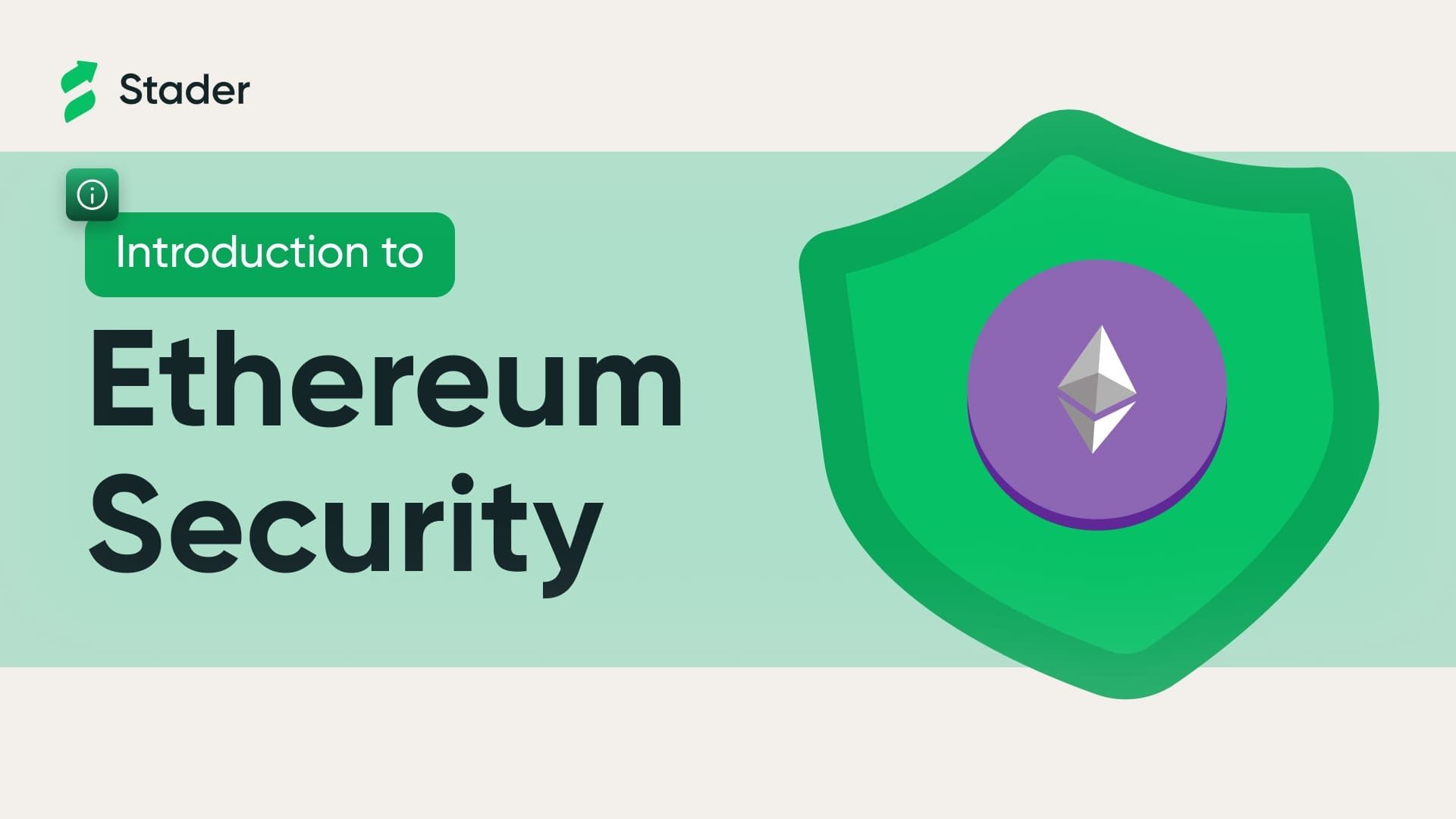Ethereum Security
Home
Blogs
Staking Basics
Ethereum Securi...

Ethereum Security
Understanding Ethereum and Its Significance
Ethereum Chain is a decentralized open-source blockchain system that features its own cryptocurrency, ETH. ETH is the 2nd largest cryptocurrency by market cap, after BTC. Majorly, Ethereum is being used to create decentralized applications (dApps), which are applications that run on the blockchain and are not controlled by any central authority.
Also Read: What Is Cryptocurrency
Common Threats and Risks in Ethereum Ecosystem
The Ethereum ecosystem showcases vulnerability to a number of threats and risks, including:
- Smart contract vulnerabilities: Smart contracts are self executing programs running on the Ethereum blockchain. They are often used to automate transactions and other tasks once the set condition is met. However, smart contracts could also be vulnerable to errors and hacks.
- 51% attacks: A 51% attack is a type of attack in which an attacker gains control of more than 50% of the computing power on a blockchain network. This allows the attacker to censor transactions, double-spend coins, and reverse transactions.
- Consensus protocol vulnerabilities: The Ethereum blockchain uses a consensus protocol called Proof-of-Stake (PoS). PoS is a secure consensus protocol, but it can be vulnerable to attacks.
- Security vulnerabilities in Ethereum wallets: Ethereum wallets are software applications that allow users to store, send, and receive ETH. Wallets can be vulnerable to hacks and malware.Therefore always keep your cryptos in a trusted crypto wallet.
Also Read: What Is A Dao
Importance of Ethereum Security
The security of Ethereum is important for a number of reasons, including:
- To protect users from losing their ETH and making the network grow bigger.
- To protect the integrity of the Ethereum network so that everyone has a fair chance to gain from the network.
- To attract developers, dApps and businesses to the Ethereum ecosystem
Also Read: ERC-20
Ethereum Wallet Security Best Practices
There are a number of things that users can do to protect their Ethereum wallets, including:
- Only use reputable wallets which have
- Store their wallets information like private keys in a safe and secluded place where no-one has an excess except them.
- Be careful about clicking on links in emails and messages
- Be wary of any offers that seem too good to be true
Also Read: ERC-4337
Protecting Yourself from Ethereum Phishing and Scams
There are a number of things that users can do to protect themselves from Ethereum phishing and scams, including:
- Only have interaction with websites and dApps that you trust.
- Be careful about connecting your crypto wallet with any network. Only connect your wallet to those networks who you trust.
- Never click on links in emails and messages from unknown senders.
- Be wary of any offers related to ETH that seem too good to be true because most often than not they’re scams.
Also Read: Smart Contracts
Future Challenges and Innovations in Ethereum Security
The Ethereum security landscape is constantly evolving. As the Ethereum ecosystem grows, new threats and risks are bound to emerge. Therefore it’s important for developers and users to stay up-to-date on the latest security threats and keep the best practices done.
Some of the future challenges and innovations in Ethereum security include:
- Developing more secure smart contracts
- Protecting against 51% attacks
- Improving the security of Ethereum wallets
- Developing new security protocols for the Ethereum blockchain
Also Read: Matic Bridges
FAQs
Q) What are the main security risks associated with using Ethereum?
Ans) Some of the main security risks associated with using Ethereum are:
- Smart contract vulnerabilities
- Phishing scams
- Exchange hacks
Q) How can I protect my Ethereum wallet from potential hacks?
Ans) Some of the best practices to protect my Ethereum wallet from potential hacks:
- Use a hardware wallet
- Keep your private key safe
- Be careful about what websites you visit and don’t connect your wallets to suspicious networks.
- Keep your software up to date
Q) What are the most common vulnerabilities found in Ethereum smart contracts?
Ans) Some of the most common vulnerabilities found in Ethereum smart contracts are:
- Reentrancy vulnerabilities
- Timestamp dependency vulnerabilities
Q) How do I recognize and avoid Ethereum-related phishing scams?
Ans) There are some common red flags to avoid Ethereum-related phishing scams including:
- Be suspicious of emails, websites, and social media posts that ask for your personal information
- Only use official websites and exchanges
- Look for typos and grammatical errors
Q) Has Ethereum transitioned to a more secure consensus mechanism?
Ans) Yes, Ethereum has transitioned to Proof-of-Stake (PoS). In PoS, validators are randomly being selected for adding blocks to the blockchain based on the amount of cryptocurrency they hold. This makes it even more difficult for attackers to gain access of the network, as they would need to own a significant amount of cryptocurrency.
Popular Searches
Eth2 Staking | Ethereum Merge | Ethereum Upgrade | Ethereum Staking Rewards | Ethx Vs Solo-Staking | How To Become A Node Operator On Eth | What Is Ethereum | Decentralisation In Ethx | Eth Node Operator | What is Dex | Eth Solo Staking | Ethereum Virtual Machine | How To Check Your Eth Transactions | ERC-20 | Polygon Vs Eth | Components Of Ethereum Network | Ethereum Layer 2 | Ethereum Gas | Benefits Of Ethereum Staking | Bnb Staking
By:
Shivendra Singh
Join Stader’s newsletter
Get the latest updates, new DeFi strategies and exclusive offers right in your email box
Analytics
© Copyright 2023 Stader. All rights reserved.











